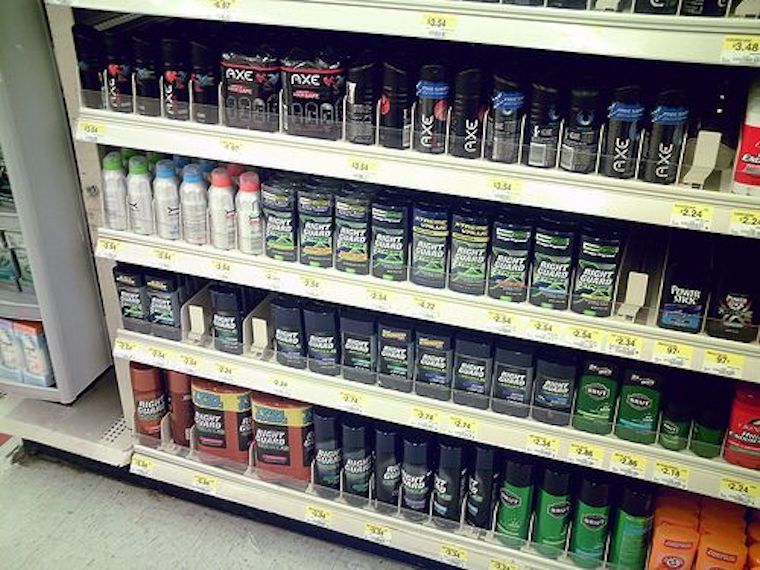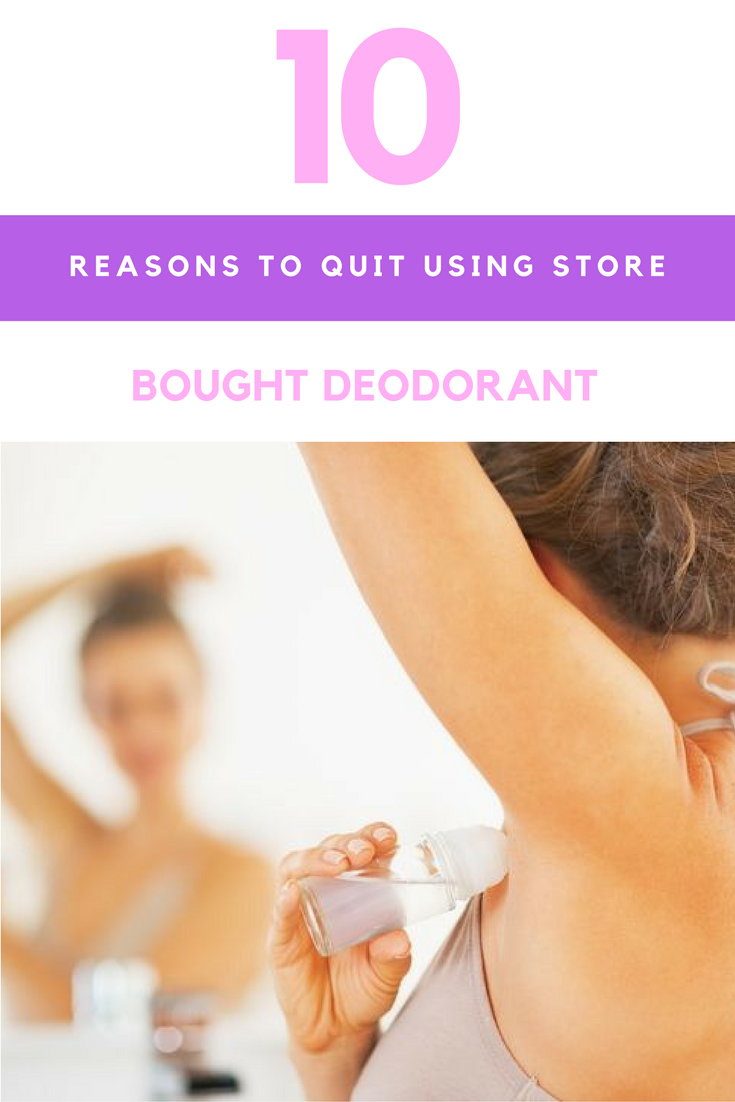
[adinserter block=”1″]
Since it’s invention over a century ago, deodorant has risen to a multi-billion dollar per year industry. Almost all Americans use deodorant but in our effort to smell pleasant, we may be compromising our health.
Read on to learn 10 frightening ways deodorant may be negatively affecting your health and life and what to use instead.
[adinserter block=”4″]

1. Deodorant Is Packed With Toxic Chemicals and Preservatives
Try looking at the back of a deodorant bottle and see how many ingredients you can pronounce. Chances are, the number of words you can actually sound out will be few and far between. All of these never-ending ingredient names that are hard to pronounce are even harder to prove as safe.
Applying these chemicals to your skin may be even worse than consuming them since this allows them to be absorbed into your bloodstream without first being filtered.
2. Deodorant Is Filled With Compounds That Mess With Your Hormones
Almost all traditional deodorants are loaded with chemicals that are capable of disrupting our endocrine system. One of the biggest offenders is a group of synthetic compounds known as parabens.
These preservatives – found in everything from moisturizers to lotions to face washes to deodorant – are included in product formulas to help prohibit the growth of bacteria, yeast, and mold. Research suggests that parabens can cause a negative impact on the body’s reproductive, immune, and neurological systems.
In addition to hormone-disrupting parabens, commercial deodorants also contain synthetic fragrance. The presence of artificial fragrance almost guarantees the presence of phthalates since manufacturers are not required to specify what the fragrance is composed of.
Phthalates, which also act as endocrine disruptors, are suspected to cause a variety of negative health effects such as allergies, certain cancers, and respiratory issues.
3. Deodorant Contains Substances That May Increase Your Risk of Cancer
Aluminum compounds such as aluminum chloride – found in concentrations up to 25 percent – are a common addition to deodorant and serve to block sweat ducts. These compounds have been found to mimic estrogen (also known as oestrogenic activity) and encourage the growth of cancer cells, particularly breast cancer.
Similar to aluminum, parabens have also come under fire for potentially contributing to breast cancer. Testing performed on sample breast cancer tumors has revealed the presence of parabens.
Although this does not pinpoint parabens as the cause of breast cancer, it does suggest that they may play a role.
Related: 25 Homemade Body Scrubs for Smooth and Healthy Skin
4. Pesticides – No Longer Just For Plants
Chances are, you would never choose to cover your underarms with pesticides but when you apply deodorant, you are doing just that.
Although it is classified as a pesticide by the Environmental Protection Agency, triclosan – an antibacterial compound – is still included as an ingredient in many store-bought deodorants as well as antibacterial soaps and other personal care products.
Triclosan presents a variety of risks to both your health and the planet. It has been linked to allergies, difficulty maintaining a healthy weight, inflammatory issues, birth defects, and thyroid conditions.
Triclosan is also thought to contribute to antibiotic resistance.
[adinserter block=”2″]
5. Deodorant Can Cause Painful Reactions and Skin Irritations
If you have ever experienced an unwelcome reaction such as red, itchy skin or a stinging sensation after applying deodorant, blame it on the product’s long list of nasty irritants.
When you apply deodorant, you are exposing the thin, sensitive skin of your underarms to ingredients such as triclosan and silica that are proven to cause irritation in the form of rashes, itchiness, swelling, and redness. Additionally, synthetic fragrances, alcohol, and parabens are capable of producing negative reactions.
6. Antiperspirants Hardly Even Work
If you assume that deodorant’s sky-high levels of nasty chemicals and additives automatically makes it 100 percent effective, you would be quite wrong.
To be classified as ‘all day protection’, the FDA (Food and Drug Administration) only requires antiperspirants to provide a 20 percent reduction in sweat.
In order for an antiperspirant to boast an ‘extra strength’ label, the FDA only requires a 30 percent reduction in perspiration. This means you are slathering your skin with harsh irritants and toxic compounds and still sweating anyway!
7. Dripping With Sweat Can Be a Good Thing
Since the human body contains millions of sweat glands, it may be for the best that commercial deodorant is hardly effective.
Sweating is a crucial bodily process that promotes detoxification and helps regulate our temperature. Sweating also helps encourage healthy immune system function and promote healthy, clear pores.
Related: 20 Of The World’s Best Natural Homemade Foot Scrub Recipes
8. Deodorants Become Less Effective Over Time
Over time, even the toughest antiperspirant will become less effective. Scientists theorize that our bodies adapt to deodorant formulas and discover ways to clear ducts that were previously plugged with aluminum.
For this reasons, it is recommended to alternate brands every six months. Better yet, why not ditch the commercial deodorant and all its side effects altogether?
9. You May Smell Fine Without Deodorant
A small portion of the population would not even produce an unpleasant odor without deodorant, but they still wear it out of habit.
To determine if you are one of the lucky few that do not have to worry about body odor, you have two options. First, you could simply stop wearing deodorant and see what happens. Second, you could evaluate your earwax (yes, you read that correctly).
Studies show that out of the two types of earwax – wet or dry – people with dry, flaky wax produce less underarm odor since they lack a particular chemical that bacteria feed on.
Without this chemical, the bacteria are incapable of producing the smelly scent typically associated with the underarm area.
10. They Leave Annoying White Streaks and Stains All Over Your Clothes
As if the health effects of deodorant are not terrifying enough, it also puts a damper on our lifestyle.
Almost all of us have left the house thinking we look attractive and put together only to realize we have been walking around with a big white streak on our dark shirt or an unsightly yellow mark on our white shirt.
Although the cause of these embarrassing, stubborn streaks is not entirely known, aluminum is considered one of the top culprits.
Easy DIY Recipes for Healthy, Non-Toxic Deodorant
After reading the scary side effects and potential health consequences of store-bought deodorant listed above, you may be ready to toss your commercial deodorant in the trash, even if you start to stink. The good news is that you can get rid of your old, unhealthy deodorant and still smell clean and fresh by making your own natural deodorant.
A wide range of natural ingredients can be combined to create effective, healthy alternatives to standard chemical-filled deodorants. A few of the more popular additions to natural deodorant include:
- Coconut oil
- Shea butter
- Baking soda
- Witch Hazel
- Essential oils
- Arrowroot starch
- Beeswax
For a demonstration of how to make your own natural deodorant, check out this DIY video that shows how to easily create natural deodorant using just four ingredients. As a bonus, homemade deodorants are also less expensive than their commercial counterparts.
If you absolutely must purchase pre-made deodorant, a rapidly growing number of companies are creating non-toxic, natural options. Aside from confirming the product is free of parabens, chemicals, and synthetic fragrance, look for a formula with ingredients that are easy to recognize and naturally sourced.
Clean up Your Diet to Clean up Your Pits
In addition to preparing your own healthier deodorant or choosing a healthier store-bought option, you can also help control your odor through the right dietary choices.
Certain foods can either promote a stinkier state or help calm it. For example, Vitamins B and C can help encourage your system to expel toxins through your urine rather than your skin. If you wish to assist your body in having a cleaner scent consider eliminating or minimizing your intake of the following foods and beverages:
- Spicy foods
- Onions and garlic
- Caffeine
- Processed foods
- Fatty, sugary foods
- Alcohol
To help keep your body’s temperature cool, stay hydrated and consume water-rich produce such as cucumber, watermelon, grapes, leafy greens, and celery.
Certain herbs can also act as natural deodorizers. These herbs include mint, sage, oregano, parsley, basil, and rosemary. Supplements such as wheat grass and chlorophyll can also have a positive impact on how you smell.
As a final dietary step to smell less pungent, consider minimizing your consumption of meat. Studies indicate that vegetarians have more attractive odors than meat eaters.
Say Goodbye To Your Store Bought Deodorant Forever
Given all of the alarming facts about deodorant and how it can negatively impact your health, changing your deodorant habits may be something you want to consider. Fortunately, you do not need to sacrifice your health in order to smell good.
If you want to smell fresh and fragrant without the negative consequences of deodorant, consider switching a few of your dietary habits, finding a healthier store-bought alternative, or experimenting with a natural, homemade deodorant recipe.
By ditching commercial deodorant, you can save money, benefit the environment, spare your clothes of unsightly white marks, and help preserve your health.